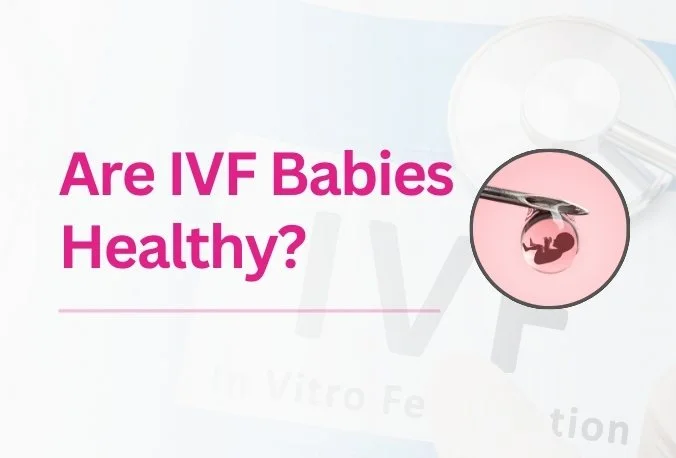Are IVF Babies Healthy?
– Published on 2 April 2024

The topic of in vitro fertilization (IVF) has fascinated many people around the world. It’s a technological marvel, allowing parents to dream about having children when natural means alone cannot succeed. However, along with this gift of life come serious questions. One of the most pressing concerns for those considering IVF is the health of the resulting children.
This comprehensive guide is designed to provide clarity on the health implications of IVF. Whether you are in the midst of infertility treatments, considering your options, or simply curious about the health of IVF children, this resource aims to equip you with the knowledge you need to make informed decisions.
Are you trying to conceive? Let Dr. Samidha Dalvi-Amale, Best IVF specialist in Pune , guide you through IVF treatment and turn your dream of parenthood into reality.
Understanding The Basics Of IVF
In vitro fertilization (IVF) is a type of assisted reproductive technology (ART) where an egg is combined with sperm outside the body, in vitro (‘in glass’), and then transferred into the uterus. Originally developed to help women with blocked or damaged fallopian tubes, IVF has expanded to help couples with a variety of fertility issues.
The process involves multiple sequential steps, technically demanding procedures, and careful management of biological variables. Each phase of IVF carries potential consideration, from the fertility drugs used to stimulate egg production, to the ovum pickup procedure, to the actual fertilization process and the health of the implanted embryo.
Health Of IVF Babies: Debunking the Myths
Physical Outcomes
A multitude of studies have been conducted to investigate the physical health outcomes of IVF babies. The early years especially are focused on, as this is a critical time for growth and development.
The general consensus is that IVF children are not only healthy but also show no significant differences in terms of birth weight, preterm birth, or need for neonatal intensive care when compared to naturally conceived children.
However, there are specific risks, such as a slightly higher chance of low birth weight and premature delivery, which might be influenced by various factors including the mother’s age, the cause of infertility, and the number of embryos transferred.
Developmental Milestones
Developmental milestones provide a good indicator of a child’s health. Studies have found that IVF children achieve these milestones within the normal range, although there may be a slight delay in some motor skills in their early years. This delay is generally attributed to the increased likelihood of multiple births associated with IVF, as twins, triplets, and higher multiples are more common in assisted reproduction due to transfer of multiple embryos.
Long-Term Implications
When it comes to the long-term health of IVF children, the available data is reassuring. They are found to be at no increased risk for chronic conditions or major developmental issues, indicating that IVF does not negatively impact their health.
Factors Influencing IVF Children
Age of the Parents
Age plays a significant role in both natural and assisted reproduction. The advanced age of either the mother or the father has been linked with an increased risk of various health conditions in offspring. For IVF, advanced maternal age is the better-documented factor.
It is associated with a higher risk of pregnancy-related complications, such as gestational diabetes and pre-eclampsia, which can indirectly impact the health of the baby. Similarly, advanced paternal age has been linked with an increased risk of certain genetic conditions in offspring.
Number of Embryos Transferred
One crucial decision in IVF treatment is the number of embryos transferred. The transfer of multiple embryos can lead to a higher chance of a successful pregnancy but also increases the likelihood of a multiple pregnancy and the associated risks.
With advances in IVF techniques like blastocyst transfer and pre-implantation genetic testing, the trend is towards elective single-embryo transfer, which reduces the risk of complications and potentially improves the outcomes of IVF babies.
Genetic Factors
Infertility can be associated with underlying genetic conditions. There’s a common misconception that IVF itself may cause genetic problems in children. However, the risk of genetic abnormalities in embryos produced by IVF techniques is essentially similar to those in embryos conceived naturally. Pre-implantation genetic screening may lower this risk, as it involves testing the embryo for numerical chromosome abnormalities before implantation.
Research Findings and Statistics
Numerous large-scale studies have been conducted around the globe to assess the health of IVF children. The most significant study to date was conducted by the New York State Department of Health, analyzing data on over 6,000 IVF children. The findings were encouraging, with IVF babies found to be as healthy as their naturally conceived peers.
Comparison with Naturally Conceived Children
IVF children are often compared to naturally conceived children in terms of health outcomes. The consensus from these comparisons is that IVF children are generally as healthy as naturally conceived children. However, certain factors, such as the mother’s age, the use of donor eggs, or the presence of other health conditions, can influence the health of IVF babies.
For prospective parents, the decision to pursue IVF is a complex one. While the health of the resulting child is a significant factor, it is important to weigh this against the potential benefits of IVF. The ability to have a child, or to have a genetically related child, is a powerful motivator for many couples.
READ MORE – IVF SUCCESS RATE IN HINDI
Informed Decision-Making
Awareness and understanding are key to making informed decisions about IVF. Research continuously improves our knowledge of the health implications of IVF, and discussing any concerns with infertility specialists can provide further insight.
It’s essential to approach the decision with realistic expectations, acknowledging potential risks while being hopeful about the possibilities IVF presents.
Couples considering IVF should be encouraged to educate themselves on the process and its potential impacts on their future children. With advancements in technology and a growing body of research, the stigma and misconceptions surrounding IVF are slowly declining. However, the decision to pursue IVF and the process itself should always be approached with caution and with the best interests of the child in mind.
MUST READ : HOW TO MAKE IVF SUCCESSFUL THE FIRST TIME?

By Dr Samidha Dalvi-Amale
IVF and Fertility specialist Medical Director- Pune IVF
